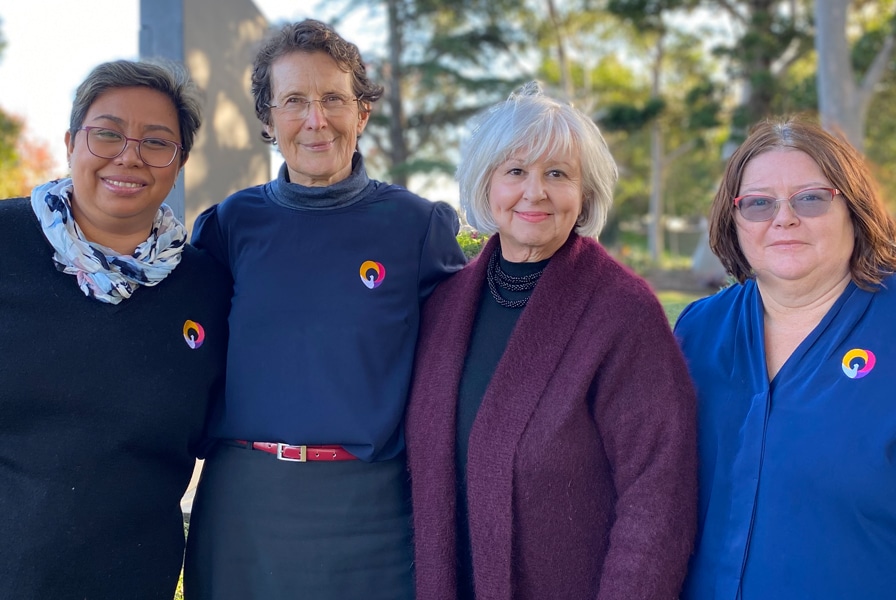
Lives are changed forever after a loved one dies - but healing is possible
Grief is a natural part of the human experience, yet it’s impossible to say how long it lasts. It is as individual as our fingerprint and dependent upon how each person learns to live with their grief. There are different ways that people grieve and many factors that may affect one’s experience of grief.
There is no set timeline for how long grief lasts, it is multi-faceted and unpredictable. There may be a whole range of emotions felt, such as anger, sadness, regret, guilt, or emotional numbness after the shock of a death, especially in early grief.
There is no right or wrong way to grieve (provided there is no harm to self or others). Everyone navigates through and manages loss, grief, and bereavement in their own way, so it is crucial to be aware and acknowledge all the feelings and emotions experi enced at this time.
Grief overtime will vary in intensity. What it looks and feels like will change, as each of us learns to integrate or live with it. The belief that there is closure from grief with time is false. Lois Tonkin found that our life grows around the grief, as we learn to carry it. Grief can ebb and flow through our life and we ad-just to its rhythms, especially during significant times in the year like birthdays, anniversa-ries and milestones.
What prolongs grief is not having safe spaces and peo-ple around us who allow us to share our story and express our grief. Grief needs to be acknowledged, validated, socially supported, heard and witnessed. If not, we may ex-perience “disenfranchised grief”.
When a person’s world has been turned upsidedown, having the right accompaniment and support goes a long way. In bereavement, a person will not only have to navigate through the initial loss but also the repercussions and challenges that come with it, such as funeral expenses, legal paperwork and insurance claims.
Grief is a natural part of the human experience, yet it’s impossible to say how long it lasts. It is as individual as our fingerprint and dependent upon how each person learns to live with their grief. There are different ways that people grieve and many factors that may affect one’s experience of grief.
There is no set timeline for how long grief lasts, it is multi-faceted and unpredictable. There may be a whole range of emotions felt, such as anger, sadness, regret, guilt, or emotional numbness after the shock of a death, especially in early grief.
There is no right or wrong way to grieve (provided there is no harm to self or others). Everyone navigates through and manages loss, grief, and bereavement in their own way, so it is crucial to be aware and acknowledge all the feelings and emotions experi enced at this time.
Grief overtime will vary in intensity. What it looks and feels like will change, as each of us learns to integrate or live with it. The belief that there is closure from grief with time is false. Lois Tonkin found that our life grows around the grief, as we learn to carry it. Grief can ebb and flow through our life and we ad-just to its rhythms, especially during significant times in the year like birthdays, anniversa-ries and milestones.
What prolongs grief is not having safe spaces and peo-ple around us who allow us to share our story and express our grief. Grief needs to be acknowledged, validated, socially supported, heard and witnessed. If not, we may ex-perience “disenfranchised grief”.
When a person’s world has been turned upsidedown, having the right accompaniment and support goes a long way. In bereavement, a person will not only have to navigate through the initial loss but also the repercussions and challenges that come with it, such as funeral expenses, legal paperwork and insurance claims.
There is no right or wrong way to grieve. Every-one navigates through and manages loss, grief, and bereavement in heir own way”
Additionally, there the re-alisation of secondary losses, companionship, income, role or even harmony when family dysfunction arises.
All require painful adjust-ment and adaptation, and it is difficult to do alone because we are meant to grieve in community.
We are created for relationship and connection, and grief is our response and reaction to the loss or change of our connection to those who have died.
Since grief can affect the physical, emotional, behavioural, mental and spiritual parts of the griever, it is no surprise some may question their relationship with God, others, or themselves.
The global pandemic has left people grieving the living and spiritual losses of social changes, especially around communal worship, funerals, weddings, baptisms etc., and may have prolonged grief associated with the loss of memory-making and witness.
Grief and faith are not to be separated. The depth and in-tensity of grief does not imply a loss of faith. Death is sorrow-ful and it is a healthy, painful part of growth and human development to grieve. While it is important to ask what our faith says, it is equally impor-tant to ask what it does not say.
In 1 Thessalonians 4:13, St Paul says, “we do not want you to be uninformed brothers and sisters, about those who are asleep, that you may not grieve as others do, who have no faith, no hope”. We grieve individually and communally. Christians grieve with the knowledge that as Christ Jesus rose from the dead, conquered death, and grieved, so we grieve. Grief is real, raw, and messy, and we grieve in hope.
“Blessed are those who mourn for they shall be com-forted.” Grief and mourning are not interchangeable. Grief is what we experience within, and mourning is the outward expressions of grief. Mourn-ing occurs in relationship, in community, it is a social behaviour. The funeral rites and Mass acknowledge that life on earth has ended and that the bereaved are entrusted into the care of the community.
Remember the death of Jesus’ friend Lazarus, “…and many of the Jews had come to Martha and Mary to console them about their brother.” (John 11: 20). Believing in Jesus, as ‘the resurrection and the life’ Mary and Martha still grieved and mourned their brother while consoled by the gathered community in the heaviness of pain and suffer-ing in bereavement. Holding on to the hope and faith that ‘…he will rise again.’
Grief - and its pain - are unavoidable. But they can be passed through with time as we seek - and find - healing.
If you are having difficulty managing your grief please contact us on (02) 9646 6908 or Email: team@griefcare.com.au



